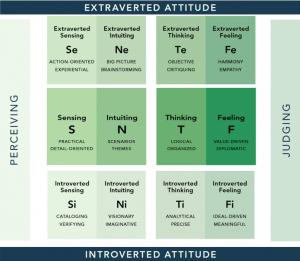Type as an excuse
I have been a passionate user of psychological type (with the MBTI and more recently the Pearman assessments) for more than half my life now, and a growing concern of mine is people’s masking—consciously or not—troubled or dysfunctional behavior with type terms. Bad decisions or poor behavior choices cannot accurately or legitimately be excused by a type preference. “I know that was impractical, but I’m an Intuitive, so . . .” “Maybe I hurt your feelings, but I am a Thinker, so what do you expect?” The most recent punching of this bruise for me came when I recently read a blog I came across, in which someone preferring Introversion laments the expectations of an extraverted world.
Her blog begins, “I’m an Introvert,” and then from there she catalogs a series of reactions and behavioral choices that pull her away from building relationships and even engaging with the world—hiding when people knock on her door, cringing when the phone rings, dreading parties and social engagements weeks before they arrive. She would prefer to read my favorite books in an effort to get to know me in lieu of actually talking to me, and she idealizes the seclusion of a monastic life.
While I feel genuine concern and sympathy for this woman’s struggle, she is not talking about Introversion. Half the world’s population prefers Introversion, but half the population are not shunning human contact and any form of outer-world engagement with this much intensity. She might prefer Introversion, but the extremity of these behaviors suggests that something else—a bit more intense—may be at play.
A link to the blog to which I’m referring is here: Momastery Blog
The Challenge of Type Development
I support (and encourage) people’s discussing and disclosing their Type preferences and challenges. To someone devoted both to human growth and development and to the ethical use of Type, however, this kind of behavioral excuse-making can appear self-indulgent and intellectually lazy. Sadly, I see it happening quite a lot. Our collective desire in the fields of Self-Awareness and Learning/Development is to create safe spaces to learn and to affirm people’s self-esteem. That said, I am growing increasingly concerned that this has led to a lack of critical thinking and a failure to call out aberrant, ineffective or even dysfunctional behavior when we come across it. You and I might both be “OK” being who we are, but that does not mean—it cannot mean—that every choice we make is a good one.
Jung gave us the concept of Introversion—the idea of having a quiet, inner-directed source of energy, and people with this preference should validate it and claim this preference and all of its quiet focus and power. But that is not the whole story. Jung also gave us the concept of typological balance, which means that the lure and seduction of this inwardly focused energy—in every Introvert—needs the balance that comes from talking, action, public engagement and connection to the outside world. Introversion pulls me inside myself, but the need for balance means I spend an appropriate amount of time extraverting as well.
My heart goes out to the author of the Momastery Blog, for her struggles and discomfort seem both genuine and challenging. However, the larger practice—and I see it frequently—of hiding behind Type labels and using personality preferences, consciously or not, to excuse or mask troubling or ineffective behavior is something that needs to be called out and something that we each need to work to avoid. Type is a powerful tool to aid in our understanding of ourselves. As a model it can offer both insight and a boost to our self-esteem. At the same time, Type must also spur us to do the work we each need to do to be more balanced and more fully type-developed. Type is a starting place, but must never be a destination where we rest.

Long synonymous with MBTI training, OKA is now a leader in the training of the Pearman Personality Integrator as well. With a number of in-person and on-line options for both tools, OKA should be your next step for your Type training exploration and training.
Click here for more data on OKA’s MBTI support classes.
Click here for information about the Pearman Personality Integrator

Great piece, Hile. Thank you.
Well said, Hile! Thank you. I have a strong clarity of preference for introversion too, and people frequently ask how I balance that with the work I do since it involves a lot of relationship building and interactions with people. As you say, it is all about balance. Proactive energy management, too. I don’t consider my preference to be a reason to hole up with a book all weekend, but I do find it important to recharge so I can engage with others at my best. Being in touch with our preferences gives us data, not excuses. 🙂
Hile,
I could listen to you speak or read your writing all day long! You are a gift to the profession!
Hi Hile, Thank you of the very thoughtful and insightful piece. I agree that we benefit from using Type as a means of better self-management and understanding of our challenges so that we can deal with those challenges more effectively. Thanks!
I also saw a similar piece from a faculty member recently. I appreciate your clarity, Hile, as always. Cheers!
Well said, Hile, well said.
I remember Otto’s quote, “Type is never an excuse.”
I also appreciate what you’re pointing out here. We cannot and should not use type to cover or excuse behaviors that do not serve us. There are issues that both require and deserve different tools and a different kind of help. Blaming type preferences can prevent people from getting other kinds of help that they need and deserve.
Great piece. Thanks, as always, for your insightful contributions,
Carol
I was hoping you would respond to the recent article. The line that says: “Type is a starting place, but must never be a destination where we rest.” says it all. You should be quoted in every workshop. That was brilliant! Thank you for your response.
Agree on all counts.
Can your post name the author instead of just “posted by OKA”? The anonymity is jarring with such a personal piece (and not all readers will guess that you wrote this, Hile!)
Well said. People forget that a key aspect of an introverted preference is seeking depth. Depth of knowledge, relations, and experience. When a person who prefers Introversion is in their area of knowledge depth or with people who are deep connections they are often animated and “behave” like people who prefer extrovertion. These lovely introverts did not become extraverted – they are indeed deeply steeped in their preference for introversion. My husband (INTP preferences) is a wonderful example of this. So glad to read your fine words here. Thanks for owning who you are and expressing it so clearly.
Good points…but really quite old in the evolution of type theory. I know the topic well because I am 80/20 introverted and now age eighty-six. However, the MBTI can be overlaid with modern psychology and neurology which postulates the existence of an executive function in the frontal lobe of the human brain that drives behaviors based on rational thoughts. Behaviors based on emotions are driven by more primitive areas of the brain stem, principally the amygdala. Jung did not have this knowledge. When these brain sections malfunction, personality disorders occur. But, my question is who or what controls the executive function???….and what controls that??…ad infinitum…where do thoughts come from??….What is consciousness and how is it expressed in communications such as blogs? Jung contributed during his time, but now it is time for building on his work, and human behavior gets more and more complicated as new discoveries are made. All of which leads me to inferred existence of a super-mind as generator, operator, destroyer of universes….GOD. I call this belief theofatalism; it is the product of my INTJ. Jung declared that active imagination drives all human behavior, so this is mine at work. In fact, nothing happens that is not first imagined, so perhaps more work is needed integrating active imagination with type.
Hey, Hile. Reinforcing of all I learned from OKA. Harry
As a mental health therapist who finds type beneficial in work with individuals, couples and families, I appreciate your clear and sensitive comments on this issue. I frequently talk to clients about “growing the muscle” that represents their non-preference, and we design “experiments” to further that growth. Clients are frequently surprised at their own flexibility, and everyone benefits. After many years of working with the MBTI, I continue to be appreciative of the contribution it can make to quality of life. Also always appreciate your insightful contributions, Hile, and the training I have received at OKA.
Hile, thank you for your BLOG posts! Your words and your life’s work is timeless and inspiring. Love to you and all my OKA family! Rita 🙂